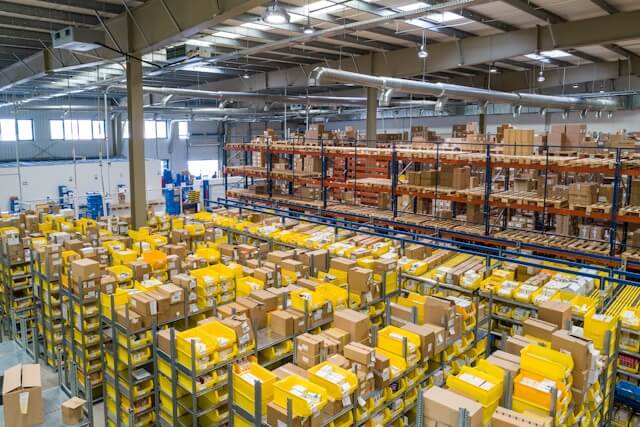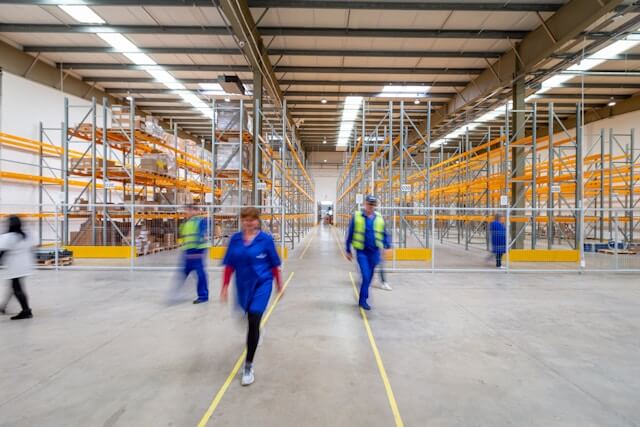Artificial Intelligence (AI) in Logistics: Technologies and Applications
In the last few years, the field of logistics has evolved thanks to changes in the industry and the introduction of new technologies. As a field that relies on supply chain management, delivery operations, and the flow of goods, there are a lot of pieces and technologies that go into optimizing various processes.
Artificial intelligence, or AI, is one of the tools more and more logistics companies are adopting for multiple workflow applications. With its ability to predict trends, automate repetitive tasks, forecast, optimize routes, and manage inventory, AI is helping companies work smarter with the resources available to them.
In this post, we’ll examine some of the main AI systems used in logistics today, how they’re used, and how specific technologies like speech AI can further benefit the field.
Key AI in Logistics Technologies

AI technologies are transforming how logistics teams operate in more than one way. In fact, according to a study, 87% of businesses believe that AI will have a significant impact on logistics operations. By implementing new AI-powered tools, logistics teams can work more efficiently, accurately, and safely. Here are a few of the main AI technologies driving these advancements:
- Natural language processing (NLP): NLP allows for better handling of customer inquiries, helps automate document processing, and can improve chatbots for a better customer service experience
- Speech recognition: This technology enhances voice-activated warehouse systems and allows for hands-free operation, making work safer and more efficient
- Machine learning (ML) algorithms: ML helps logistics teams optimize route planning, inventory management, demand forecasting, and more by studying historical data
- Predictive analytics: Through gathering large quantities of historical data to forecast trends, predictive analytics tools can help with demand planning, inventory optimization, and identify potential risks that can disrupt a supply chain before they occur
- Robotics and automation: Robotics and automation systems can automate repetitive and manual tasks like sorting, packing, transporting, and more
- Computer vision: This technology facilitates automated inspection and quality control to boost order fulfillment and accuracy by reducing human error
- Speech AI: Speech AI systems integrated advanced voice recognition with other processing technologies to optimize communication, operation, automation, and more
How to use AI in Logistics – Use Cases
AI’s applications in logistics are vast, touching various areas of operations across a supply chain. According to a report by McKinsey, the implementation of AI in logistics has helped teams improve costs by 15%, inventory levels by 35%, and service levels by 65%. Through AI integration, logistics teams are able to enhance critical operations, such as planning, forecasting, delivery, and even warehouse management. To better grasp AI’s transformative power in this field, let’s take a closer look at some AI use cases in logistics.
Route Optimization
AI algorithms can be used to analyze traffic patterns, weather conditions, and historical data to determine the best routes that help companies cut down on delivery time and fuel consumption.
Demand Forecasting
ML models can predict future demand based on historical sales data and market trends, enabling better inventory management and planning.
Inventory Management
Aside from forecasting, AI systems can be used to track inventory levels in real-time, alert teams to restocking needs, and automate merchandise reordering, all of which help teams maintain optimal stock levels, reduce storage costs, and avoid stockouts or overstock.
Warehouse Automations
Robotics and AI-powered platforms can automate tasks like inventory sorting, order packing, and the transportation of goods throughout a warehouse, making order management more accurate, efficient, and less labor-intensive.
Last-mile Delivery Optimization
AI technologies can be used to enhance the final stages of delivery by optimizing routes, predicting delivery windows for individual orders, and increasing customer satisfaction with real-time order tracking and updates.
Challenges and Considerations of Adopting AI in Logistics

While there are many benefits of AI in logistics, integrating a new AI system into your existing tech stack can be challenging. For starters, you need to make sure a new technology is compatible with your logistics software and that all privacy and data concerns are addressed. While each type of AI in logistics has its own implementation process, it’s still important to consider the various challenges that come with adopting new AI technologies, such as:
Data Privacy and Security Concerns
It’s critical to handle sensitive information gathered by AI tools in a way that addresses privacy issues. In addition to building trust with your customers, there are also certain regulations that you may need to contend with to ensure the secure transmission and storage of data gathered through AI platforms.
Integration with Existing Systems
New AI technologies can be tricky to integrate with your legacy system, making implementation long and complex. There can be compatibility issues which can lead to significant investment in technology upgrades and additional employee training.
Accuracy and Reliability
With AI, it’s always important to consider a specific platform’s level of accuracy and reliability. As AI and its various technologies continue to evolve, there are a lot of opportunities for misinterpreted commands, variations in speech, and other nuances that can lead to operational errors.
The Role of Speech AI in the Logistics Industry
Speech AI refers to the use of various voice AI technologies, like speech recognition, NLP, and others, that when used together, can interpret and respond to spoken language. In logistics, speech AI can enhance communication, automate processes, and help teams improve operational efficiency entirely through speech.
Supply chain management can be improved through the implementation of speech AI by enabling voice systems for tasks like inventory checks, order picking, and real-time communication. Warehouse workers can complete tasks hands-free, increasing productivity and safety.
Similarly, speech AI can also help improve order fulfillment accuracy and processing times by reducing the need for manual data entry and minimizing errors. Through instant updates and data gathered through speech, order logistics can be made a lot smoother.
Speech AI in Logistics Examples
To better illustrate how speech AI can work in real-world logistics scenarios, let’s take a look at a few use cases where these systems can be implemented for more seamless operations.
- Voice-enabled warehouse operations: Workers can use voice commands to complete tasks like order picking, sorting, and packing, allowing for hands-free operation
- Voice-controlled inventory management systems: Speech AI helps teams conduct inventory checks so workers can locate inventory quickly without manual intervention, reducing opportunities for error and cutting down on time
- Speech-based order fulfillment: Employees can receive voice instructions for order picking and processing, streamlining the entire fulfillment process and improving overall order accuracy and warehouse productivity
Implementing Speech AI in Logistics with aiOla
The challenges we discussed above also hold true for speech AI systems, as voice data needs to be securely stored and a new platform needs to integrate seamlessly with existing platforms for optimal performance. With aiOla’s speech AI technology, integration is smooth and worry-free.
aiOla is a speech AI technology that allows workers to complete tasks through voice while collecting essential data. It can understand over 100 different languages as well as different accents, dialects, and industry jargon in any acoustic environment, making it highly accurate and reliable. As it operates entirely through speech, employees are left entirely hands-free, making workflows safer, quicker, and more accurate. With aiOla, logistics teams can:
- Complete inspections in a matter of seconds
- Collect otherwise lost speech data for critical real-time decision-making
- Automate specific tasks through the power of speaking
- Make work safer by remaining hands-free and focused on the task
With aiOla, logistics and warehousing teams have seen a reduction of 4 safety incidents per shift, while simultaneously increasing the number of pallets handled per hour by 25%. The best part is, as it’s entirely speech-based, there’s virtually no learning curve to adopting aiOla into your existing tech stack, meaning you can get started quickly after implementation without long training and onboarding programs.
AI in the Logistics Industry: A Growing Necessity
AI is here to stay, and when it comes to transforming industry standards in logistics, it’s clear that these technologies will become standard rather than exceptional. AI is helping logistics and warehouse teams work more efficiently, save on costs, improve safety, and become more productive. With speech AI like aiOla that requires almost no onboarding time, implementing cutting-edge technologies in your logistics operations is becoming more attainable to teams of any size.
Book a demo with one of our experts today to see how aiOla can improve your logistics operations.


